The Intel Core i9-9980XE CPU Review: Refresh Until it Hertz
by Ian Cutress on November 13, 2018 9:00 AM ESTHEDT Performance: Encoding Tests
With the rise of streaming, vlogs, and video content as a whole, encoding and transcoding tests are becoming ever more important. Not only are more home users and gamers needing to convert video files into something more manageable, for streaming or archival purposes, but the servers that manage the output also manage around data and log files with compression and decompression. Our encoding tasks are focused around these important scenarios, with input from the community for the best implementation of real-world testing.
All of our benchmark results can also be found in our benchmark engine, Bench.
Handbrake 1.1.0: Streaming and Archival Video Transcoding
A popular open source tool, Handbrake is the anything-to-anything video conversion software that a number of people use as a reference point. The danger is always on version numbers and optimization, for example the latest versions of the software can take advantage of AVX-512 and OpenCL to accelerate certain types of transcoding and algorithms. The version we use here is a pure CPU play, with common transcoding variations.
We have split Handbrake up into several tests, using a Logitech C920 1080p60 native webcam recording (essentially a streamer recording), and convert them into two types of streaming formats and one for archival. The output settings used are:
- 720p60 at 6000 kbps constant bit rate, fast setting, high profile
- 1080p60 at 3500 kbps constant bit rate, faster setting, main profile
- 1080p60 HEVC at 3500 kbps variable bit rate, fast setting, main profile
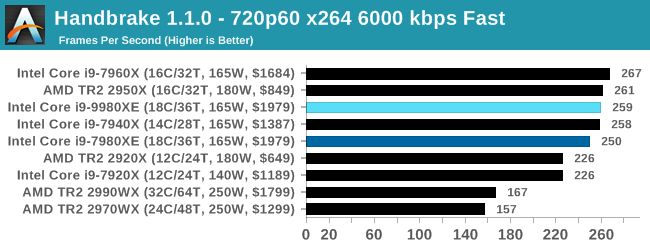
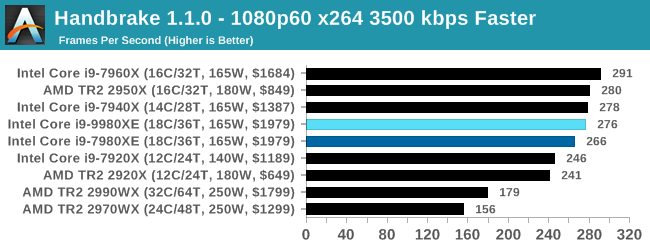
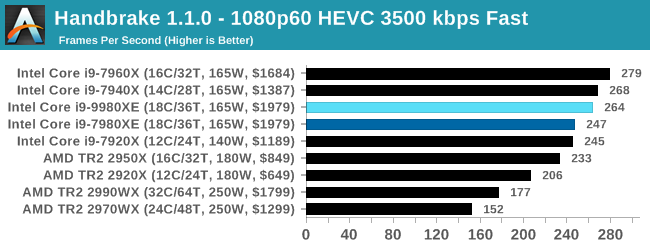
The 9980XE performs better than the 7980XE in our testing by a few percentage points, however these tests seem to benefit from fewer cores and a better turbo frequency profile.
7-zip v1805: Popular Open-Source Encoding Engine
Out of our compression/decompression tool tests, 7-zip is the most requested and comes with a built-in benchmark. For our test suite, we’ve pulled the latest version of the software and we run the benchmark from the command line, reporting the compression, decompression, and a combined score.
It is noted in this benchmark that the latest multi-die processors have very bi-modal performance between compression and decompression, performing well in one and badly in the other. There are also discussions around how the Windows Scheduler is implementing every thread. As we get more results, it will be interesting to see how this plays out.
Please note, if you plan to share out the Compression graph, please include the Decompression one. Otherwise you’re only presenting half a picture.
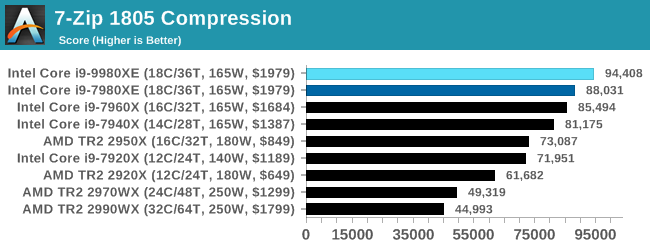
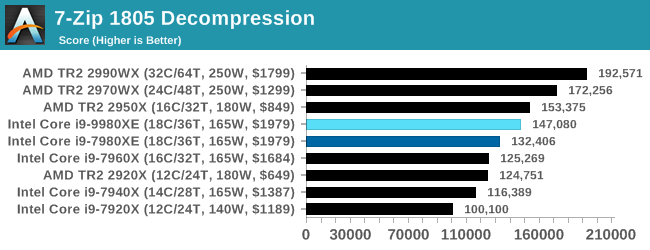
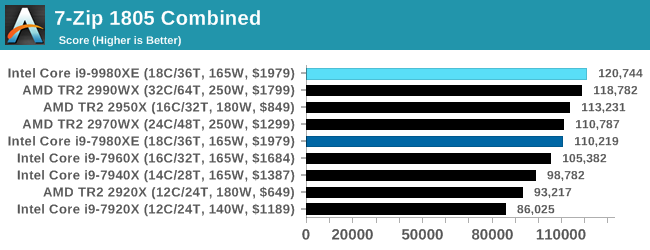
The increase in performance in both compression and decompression over the 7980XE pushes the 9980XE to the top of the overall standings.
WinRAR 5.60b3: Archiving Tool
My compression tool of choice is often WinRAR, having been one of the first tools a number of my generation used over two decades ago. The interface has not changed much, although the integration with Windows right click commands is always a plus. It has no in-built test, so we run a compression over a set directory containing over thirty 60-second video files and 2000 small web-based files at a normal compression rate.
WinRAR is variable threaded but also susceptible to caching, so in our test we run it 10 times and take the average of the last five, leaving the test purely for raw CPU compute performance.
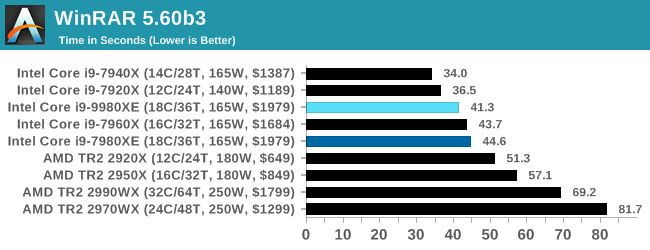
With WinRAR being a variable threaded and memory sensitive tool, while the 9980XE performs better than the 7980XE, having fewer Intel cores seems to work best.
AES Encryption: File Security
A number of platforms, particularly mobile devices, are now offering encryption by default with file systems in order to protect the contents. Windows based devices have these options as well, often applied by BitLocker or third-party software. In our AES encryption test, we used the discontinued TrueCrypt for its built-in benchmark, which tests several encryption algorithms directly in memory.
The data we take for this test is the combined AES encrypt/decrypt performance, measured in gigabytes per second. The software does use AES commands for processors that offer hardware selection, however not AVX-512.
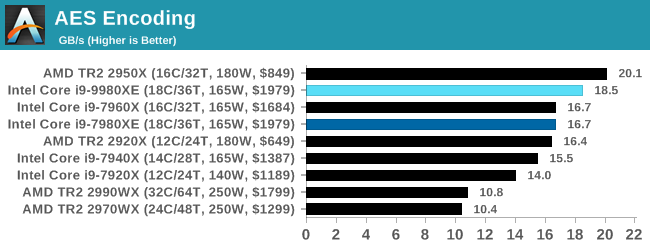
AES encoding seems to prefer AMD's situation, although the way the >16 core TR2 parts are configured is more of a hindrance. As expected, the i9-9980XE is the best Intel performer here.










143 Comments
View All Comments
nexuspie - Tuesday, November 13, 2018 - link
You're so ghetto you're using a 2500k from 2011? Stop posting and get a job so you can afford an upgrade. I guess it proves that Intel makes good chips though if you can wait this long to upgrade.LordanSS - Tuesday, November 13, 2018 - link
Still rocking a 3770k. Not going to pay "Intel price" for 4-cores and just 20% more IPC than I have.Zen2, that'll be my swap.
Spunjji - Tuesday, November 13, 2018 - link
I seriously don't understand people who are so insecure about their choices that they need to mock random people on the internet for not overspending on their computer equipment. If your use case enables you to spend on the absolute best way past the point of diminishing returns, that's great for you! Be happy and maybe lay off the comment sections..?Kilnk - Tuesday, November 13, 2018 - link
No... all it really means is that for the first time in the history of computing, software demands have allowed computing power to reach the level of "good enough" for a lot of users. Also things are a lot more GPU dependant than they used to be. CPUs are less relevant.duploxxx - Tuesday, November 13, 2018 - link
It is quite obvious. From a general performance/price/power perspective the TR2 2950x is the one to get. Forget all the uber expensive Intel junk.qap - Tuesday, November 13, 2018 - link
I guess it depends on i9-9820X. And I have a feeling it would be similar story to 2990WX vs i9-9980XE - AMD scoring in some benchmarks while intel keeping victory in other.Those who matter (actual buyers) will look at bench that matters to them while fans would be squealing that this or that benchmark is more important and therefore their favorite CPU is the best.
eva02langley - Tuesday, November 13, 2018 - link
I would honestly get an EPYC platform over the TR 32 cores. However, at this point, you have a really particular workload that requires such capabilities.It all depends on your needs, but true, Intel is not competitive at their price tags.
nexuspie - Tuesday, November 13, 2018 - link
These benchmarks show that the 9980's 18 cores often BEAT the 2990wx's 32 cores. AMD cores are garbage.Targon - Tuesday, November 13, 2018 - link
In what world are AMD cores garbage when they are more than competitive enough to push Intel into releasing the first significant changes in six years? Zen2 cores are also here(with the new Epyc chips), and Ryzen 3rd generation will be launching within the next five months or so, which WILL have a higher IPC than Intel at that point.twtech - Thursday, November 15, 2018 - link
The upgrade AMD really needs at this point is a software one - from Microsoft. The 2990WX performs pretty well when using Linux, but it struggles with most workloads in Windows. I hope that Zen 2's chiplets will do a little better in terms of memory access.